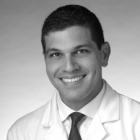Parkinson’s OFF: What It Is and How to Manage It
With Dr. Yasar Torres-Yaghi
This webinar was recorded live on August 26, 2021.
When you take Parkinson’s medications regularly and your symptoms re-appear or worsen, you are experiencing an OFF time. That seems to be a simple enough definition of OFF; however, it’s anything but simple. And when you feel OFF, it’s anything but pleasant. Nearly 35% of people with Parkinson’s experience OFF times (and this percentage increases with age), and OFF times can negatively impact quality of life in a myriad of ways. But there are ways to reduce OFF times. During this webinar, we discussed what it means to be OFF, the different types of OFF times, how to communicate about OFF, ways to treat OFF, and more.
Click the button above and fill out the brief form to access the recording. You’ll receive a confirmation email with the link to the recording, transcript, and additional resources.
Your Speaker for the Webinar

Attending Physician, Movement Disorders; Assistant Professor, Department of Neurology at Georgetown University
Dr. Yasar Torres Yaghi is co-Director of the Lewy Body Dementia Clinic, spearheading an initiative to care for a growing population of aging patients with neurodegenerative conditions. Yaghi obtained his medical degree from George Washington University School of Medicine and subsequently completed his residency and fellowship training at MedStar Georgetown University Hospital. His sub-specialty training was in neurorestoration research in movement disorders and dementia, where he actively participated in clinical research. He has a broad background in clinical research, with specific training and expertise in in Lewy body dementia and atypical Parkinsonism and has been an integral member of numerous clinical trials. His research focus is in neurodegeneration and movement disorders such as Lewy body dementia, and Parkinson’s disease. Additionally, he evaluates patients with Alzheimer’s disease, chronic traumatic encephalopathy, and Huntington’s disease. In addition to caring for patients in clinic and teaching medical students, he has strived for a career in combining research and clinical work.
THANK YOU TO OUR PRESENTING PARTNERS OF THE LIVE WELL TODAY WEBINAR SERIES
While the generous support of our sponsors makes our educational programs possible, their donations do not influence Davis Phinney Foundation content, perspective, or speaker selection.






